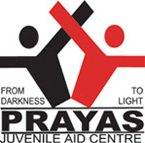Prayas Health Service-PHS
Working with Slum Communities Prayas has attempted to fill this gap with its limited resources and has given priority to health and nutrition within this intervention programme. Our philosophy is to respond to the felt needs of these children. Rights and needs of a child are synonymous - with this vision the Prayas Health Service started in 1995 from a health camp near Jama Masjid in the walled city, with the aim of providing health services to city’s half a million street and working children, who live on the streets of Delhi and are beyond the pace of any health programme of the Government. Street children have special health problems because of the conditions in which they live and grow. Since then, we have slowly created some infrastructure such as mobile health vans and clinics in the slums areas. We have reached out to thousands of children through health camps. But we have not been able to give them complete and holistic care, which they deserve and which is also their basic right and which India has committed to the international, constitutional and legal covenants. One of the most significant services provided by Prayas for neglected children is through the network of Prayas Health Services (PHS). Prayas Health Services is an apex unit for all health services provided by Prayas for the unserved and underserved areas at various slum communities in Delhi especially where Prayas Projects are located. The PHS is located at 8/35 Industrial Area, Kirti Nagar. In spite of its fixed locations, the PHS has a wide and far flung reach through its mobile health vans to various slum clusters in Delhi. Prayas Health Services already has a functional clinical set up to cater to the needs of men, women and children in communities of Kirti Nagar and adjoining areas. A regular free OPD runs at the premises of PHS to meet the health needs of men, women and children and of other vulnerable sections of the slum communities in Kirti Nagar and Pandav Nagar areas. Based on the need, some of the children are referred to the hospital for special treatments along with the health workers of PHS. Minor procedures like incision and drainage of abscesses, minor burns dressing, minor ENT surgeries have also been started. The PHS also has a DOTS center that detects and treats TB patients. Apart from this, the routine investigations like Hb, TLC, DLC, ESR, WIDAL, VDRL, Urine Routine Sugar, ABO and Rh grouping, peripheral smear of malaria parasites, urine bile salt and bile pigment are available through the laboratory services of PHS. The laboratory services assist in through detection of the problem. In addition to this, the PHS worked for the de-addiction of tobacco and alcohol. This WHO aided project on anti-tobacco aimed at reducing the incidence and prevalence of such addictive habits among street/slum children by spreading awareness about the life threatening effects/ consequences of such harmful addictive behavior patterns. Apart from this, the PHS has regularly been participating in Family Health awareness Campaigns organized by the Government of NCT of Delhi, Pulse Polio Campaigns, health stalls of India International Trade Fair focusing on RCH components, MTNL Perfect Health Melas and Perfect Health Parades. The PHS has also been a regular participant in Blood Donation Campaigns organized by Delhi State AIDS Control Society (DSACS). Not only this, Prayas health service has also taken up School AIDS Awareness project five times in the last few years, organized by DSACS/UNESCO every year. Major issues There are an estimated 2 to 5 million people infected with HIV in India today, and 50,000 to 100,000 cases of AIDS may have already occurred in the country. Contrary to traditional belief, sexually transmitted diseases and sex with multiple partners are common in the country, both in urban and rural areas. An estimated 3 to 4 percent of some rural populations have a sexually transmitted disease. The tobacco epidemic is an international problem with developing countries set to bear the brunt of the problem in future. By 2030, if present trends continue unchecked, there will be 10 million deaths per year globally due to tobacco-related disease, with 70 per cent of these deaths taking place in developing countries. Not only this addiction of alcohol among children is increasing in India. Alcohol transnationals are shifting their focus to Asia and other developing countries (young population and a growing economy) as the American and European markets are saturated. With an increase in per-capita incomes, trade barriers falling, and alcoholic beverages advancing into new markets in developing countries, alcohol consumption is likely to increase.Prayas ImpactReal Impact, Measurable Results
270
fundraising & donation campaign
89
of beneficiaries have increased coping skills
93
of beneficiaries saw an increased income or educational level
83
increased community needs
It’s not just a donation, it’s an
investment in a children’s future…
Support by volunteering
Become a Volunteer
